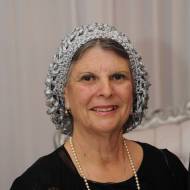The Golden Age or The Third Generation are fancy titles referring to anyone over 60. In plain language senior citizens.
Becoming a Golden Ager is a very special bracha (blessing). It is not something we should take for granted. Being able to see our children grown-up, becoming parents themselves and living productive lives brings joy to our hearts.
And grandchildren and great-grandchildren….the joy is a blog all by itself.
Being over 60, I was invited to join our moetza (regional council) Sdot Negev seniors group. The group offers friendships, creative activities, jewelry making, ceramics, painting, music, Torah shiurim (classes) and outings. There is an exercise class, two delicious meals are served and door-to-door mini bus service.
I have always been interested in ceramics and jewelry making and so I decided to give it a try. So bright and early yesterday morning at 8:15 the mini bus picked me up and I was on my way.
Arriving at the moadon [community building], I was greeted by Shira a very sweet counselor who showed me around. When Shira introduced me to some of the women who had already arrived and told them that I speak English, immediately one lady said, I want to learn English, then another and another.
I joined the table of ladies and we spoke a little about ourselves, me murdering Hebrew and them breaking their teeth to speak English. Somehow, we understood each other.
Coffee and then breakfast was served, and the other staff who co-ordinate this program came to introduce themselves and say hello to me. Everyone was so very warm and friendly. I felt very comfortable.
As I looked around the room, I felt in awe. Here were the real settlers of the Negev.
Sitting with me were men and women who were born in Israel many, many years before the modern state was recognized. Others were olim (immigrants) from Morocco, Tunisia, Yemen, Iraq, Iran and Egypt. They left their birth home, most being kicked out by cruel arab governments who stole their land and property and they traveled by boat and settled in Eretz Yisrael (the Land of Israel).
There any many heroic and terrifying stories of how these brave people escaped with just the clothes on their back.
Our early government’s history of receiving these olim is not a nice story. The treatment they received by the elites was shameful. They were treated as second-class citizens and sent to live in a barren and desolate area known as the Negev.
The olim brought with them their traditions, their food, their music, their rabbis and, above all, their love for Eretz Yisrael, the Jewish homeland. They raised families. Having 10, 11, 12 and 13 children was not unusual. Everyone had their chores.
They went about settling the land. Not having the modern farming tools that we have today, they worked with their hands from sunrise to sunset. They plowed and planted fields, started kibbutzim and moshavim. They built homes, schools, Batei Knesset [synagogues]. They became businessmen and tradesmen. They welcomed guests with a warm Shalom Aleichem, a kiss on the cheeks and food.
With a bracha from Above, the settlers of the Negev did the impossible. They settled the Negev, and this dry sandy, barren, desolate land was blooming. Green, green land with fields and fields of wheat and vegetables as far as the eye can see. The sweet smells of fruit orchards and flower gardens permeate the air.
From small farming communities, developmental towns and cities were built. People from other areas of Israel were moving to the Negev.
As I look around at all the seniors in the room, I have the utmost respect for them and want to say thank-you. Thank-you for your hard work in settling our land. The Negev has been my family’s home for the past 10 years. Thank-you for making the Negev a wonderful place to call home.


